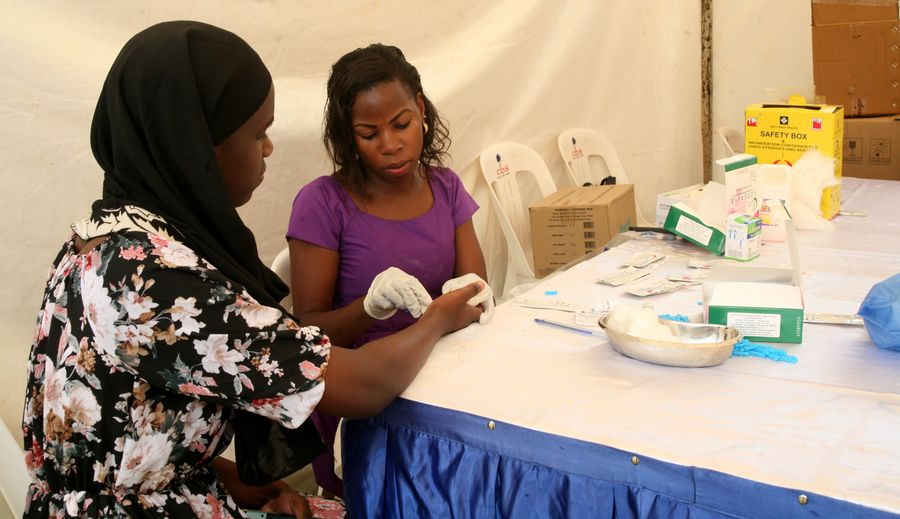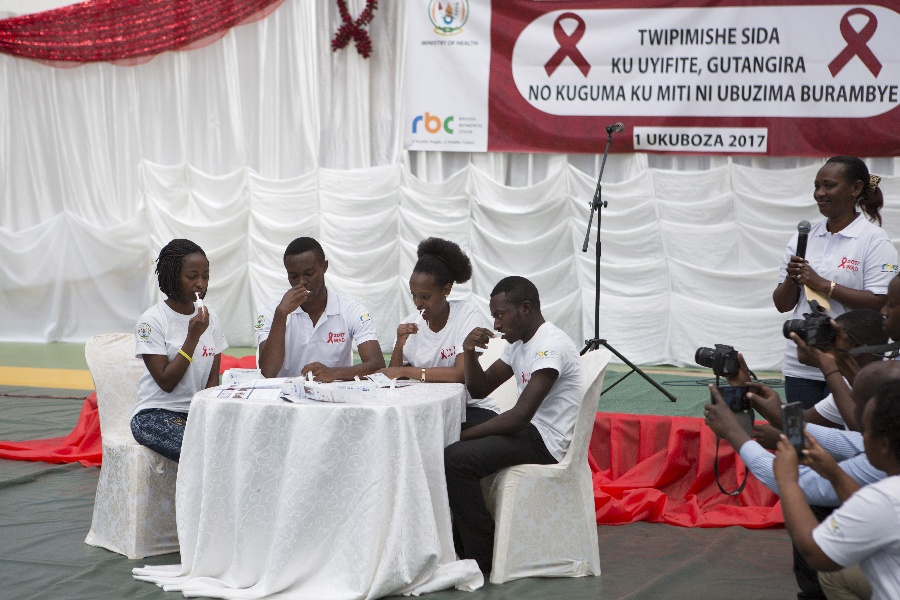
A health worker (R) attends to a local during a public awareness campaign aimed at reducing new HIV infections, in Kampala, Uganda, May 16, 2019. /Xinhua
A health worker (R) attends to a local during a public awareness campaign aimed at reducing new HIV infections, in Kampala, Uganda, May 16, 2019. /Xinhua
Editor's note: Rémy Rioux is the chief executive officer of the Agence Française de Développement (French Development Agency). Peter Sands is the executive director of the Global Fund to Fight AIDS, Tuberculosis, and Malaria. The article reflects the authors' opinions, and not necessarily the views of CGTN.
As part of the United Nations Agenda for Sustainable Development, the international community set itself the ambitious goal of eradicating HIV, tuberculosis, and malaria by 2030. Despite the extraordinary progress that has already been made, ending these pandemics and achieving the broader goal of ensuring the health and wellbeing of all will require ramping up efforts to support countries in building resilient and inclusive health systems.
The Global Fund to Fight AIDS, Tuberculosis, and Malaria, a public-private partnership, has contributed substantially to this effort, by massively scaling up prevention and treatment. In countries where the Global Fund invests, 18.9 million people received antiretroviral therapy for HIV in 2018, 5.3 million tuberculosis patients were treated, and 131 million mosquito nets were distributed.
These efforts have proved tremendously effective in reducing these pandemics' death toll. The latest figures indicate that 32 million lives have been saved since the Global Fund's creation in 2002. Over the last decade, the annual number of deaths from HIV, tuberculosis, and malaria have been lowered by about half.
Yet we are still not on track to eliminate HIV, tuberculosis, and malaria by 2030. To achieve this goal, we must not only expand access to treatment drastically; we also need to achieve a sharp reduction in new infections.

Demonstration on how to use oral HIV testing kits during the World AIDS Day activities in Kigali, Rwanda, Dec. 1, 2017. /Xinhua
Demonstration on how to use oral HIV testing kits during the World AIDS Day activities in Kigali, Rwanda, Dec. 1, 2017. /Xinhua
Success will require clear political leadership and sustained investment in critical capacities, such as well-trained community health workers, cost-effective supply chains, quality data systems, and well-equipped laboratories. To ensure that health services reach the poorest and most marginalized, barriers to health access – such as user fees, human rights-related impediments, or gender inequalities – must be dismantled. Active community engagement will be essential here.
Of course, there is no one-size-fits-all solution. Countries and communities need to devise strategies that account for their residents' needs and reflect the particular disease threats they face.
Moreover, no single external development partner can provide all of the necessary support. That is why we are calling for innovative coalitions comprising multilateral and bilateral development organizations that leverage their complementary strengths to strengthen national capacities.
Such coordinated support is needed most urgently in regions – for example, the Sahel in Sub-Saharan Africa – that have weak institutions and infrastructure, and that are particularly vulnerable to security threats and environmental crises.
In Cote d'Ivoire, the Global Fund and the Agence Francaise de Developpement (AFD) have invested in building, together with the Ivoirian government, a regional bureau for the national medical drug-supply center. This will facilitate treatment delivery as close as possible to communities, thereby strengthening national health authorities' capacity to reach the most vulnerable in a sustainable way.
In the same vein, the AFD and the Global Fund are supporting Niger's Ministry of Public Health in its efforts to expand access to health products and strengthen the national laboratory network, thereby improving diagnosis, including for HIV/AIDS, tuberculosis, and malaria. By ensuring synergy among activities and preventing duplication of efforts, we can support Niger in strengthening its health system, including at the community level.
Avoiding silo-based activity is the raison d'etre (reason of being) of the recent partnership agreement between the Global Fund and the AFD. Under the leadership of national health authorities, we are pursuing greater convergence and synergy among programs to fight HIV/AIDS, tuberculosis, and malaria, such as those the Global Fund finances, and initiatives to strengthen health systems, such as those in which the AFD invests. Underscoring the extent to which these two areas are interconnected, the Global Fund is already the largest multilateral provider of grants for strengthening health systems, investing well over 1 billion U.S. dollars per year in the cause.
By combining our organizations' strengths, we are reaffirming our commitment to ensuring effective cooperation and coordinated action to eradicate HIV, tuberculosis, and malaria, and to building strong and resilient health systems, particularly in the most vulnerable countries. The international community has a shared responsibility to fulfill its commitments without leaving anyone behind.
To end the HIV, tuberculosis, and malaria epidemics by 2030, a business-as-usual approach will not suffice. We must step up the fight. That means investing more in health systems and forging effective new partnerships, such as the one between the AFD and the Global Fund.
Copyright: Project Syndicate, 2019.
(If you want to contribute and have specific expertise, please contact us at opinions@cgtn.com.)